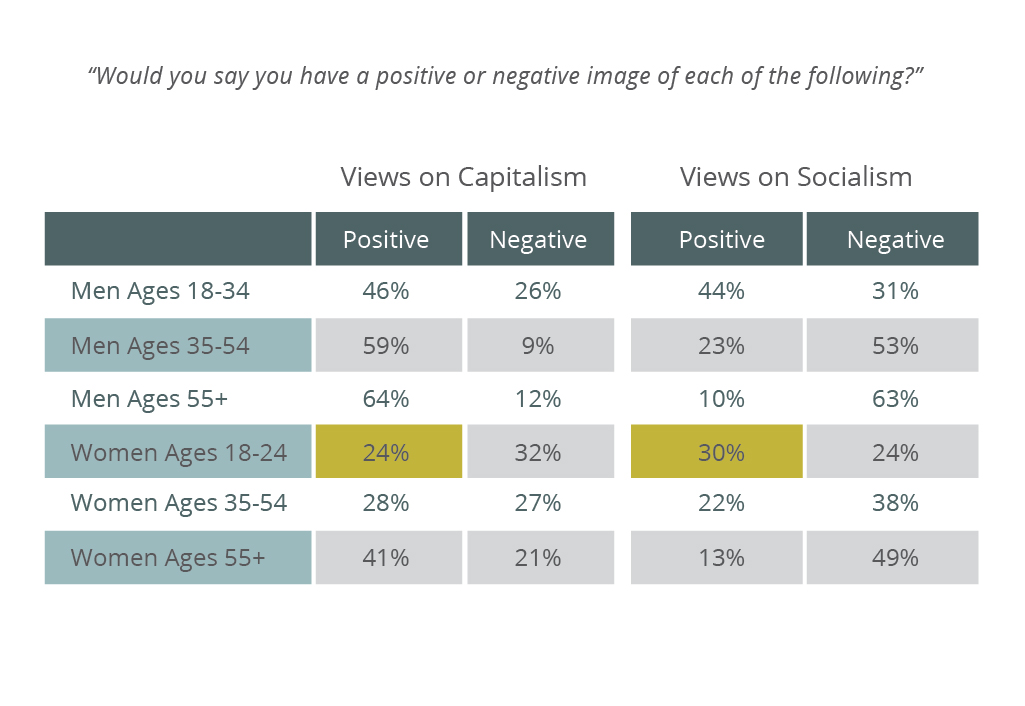featured insight
featured insight

Do you Know How Voters Feel About Capitalism and Socialism?
Few words in political discourse are as charged as the term socialism. Even getting people to agree on a definition is complicated. What is socialism? Is it government control of the means of production? Is it a market economy with significant government regulation?
Despite how commonplace the term is in the public discourse, the reality is Americans aren’t sure how to define socialism. When asked to articulate their understanding of socialism in this Gallup Poll, respondents’ answers were all over the map. Almost a quarter of respondents (23%) gave equality-based responses (“equal standing for everybody, all equal in rights, equal in distribution”). Another 23% had “no opinion” on what socialism meant. Something closer to a more traditional answer of government ownership was given by 17% of respondents (“Government ownership or control, government ownership of utilities, everything controlled by the government, state control of business”).
But having a different definition of socialism than their neighbor doesn’t stop people from having very strong views of socialism and capitalism.
Perceptions of Capitalism and Socialism
In a nationwide poll that Meeting Street Insights conducted in December, we asked voters the following question: “Would you say you have a positive or negative image of each of the following [capitalism and socialism]?”
The winner was clear: voters are more positive toward capitalism than they are toward socialism.
About 44% of voters report having a positive view of capitalism, while only 21% had a positive view of socialism. As you might imagine, the negative views are flipped, with 20% of voters reporting having a negative image of capitalism and 45% having a negative image of socialism.
Political Leanings and Views of Capitalism and Socialism
Not all that surprising is the variances we see when we segment the responses by political party. Republicans, Independents, and Democrats have different views on capitalism and socialism.
Republicans have very strong opinions generally, reporting very positive views on capitalism (65%) and almost equally negative views on socialism (69%).
Independents also feel more positively toward capitalism and negatively towards socialism, but they are less enthusiastic than Republicans. Independents’ views are less defined, with 37% having a positive view of capitalism compared to 65% of Republicans, and 45% of Independents having a negative view of socialism (69% of Republicans). Nearly one-fifth (19%) of Independents say they have neutral opinions on both.
Democrats, not surprisingly, are less enthusiastic than Republicans or Independents about capitalism, with 30% expressing a positive view of capitalism (compared to Republicans’ 65% and Independents’ 37%), matching the same percentage who hold a negative view (30%). They also view socialism more positively than the two other groups (32%), but still not with overwhelming support.
Demographics and Views of Capitalism and Socialism
Socialism is more popular among younger voters. Both men and women between the ages of 18 and 34 held more positive than negative views of socialism. However, Millennial women are the only group who are more positive toward socialism (30%) than capitalism (24%).

2018 Election and Socialism
Three of the key voter groups that helped Democrats win control of the House of Representatives in 2018 — Hispanics, white women with at least a college degree, and moderate voters — are not particularly big fans of socialism, all holding upside down image ratings.
The inconsistent definition of socialism means this debate is less about policy and more about the reaction to the concept of socialism. Furthermore, while there is overwhelming aversion to socialism on the Republican side, there is hardly overwhelming support for the policy from Democrats. Our data supports what Republican leaders are quick to point out: Democrats are vulnerable on the socialism connection with key swing voter groups. It will especially be the case if Bernie Sanders’ current momentum carries him to the Democratic nomination, making it a useful tool for Republicans going into 2020.
This study reflects findings from a Meeting Street Insights online national survey of 1,000 registered voters conducted December 28 – 30, 2019.
What do you need to know? We can help. Get in touch or subscribe to our newsletter.

